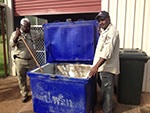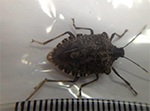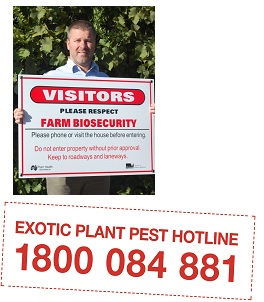Biosecurity - local action to prevent exotic pest incursions
Author: Jim Moran | Date: 23 Jul 2014
Jim Moran,
Department of Environment and Primary Industries, Plant Health Australia and Grain Producers Australia.
Keywords: grains, biosecurity, farm hygiene, border interceptions, exotic plant pest threats.
Take home messages
- Biosecurity is the protection of farms, industries and the natural environment that could be harmed through the introduction of new pests.
- Australia’s borders are under pressure from pests and diseases entering with cargo and tourists. There are numerous detections but what if they escape detection?
- Prevent exotic pests and diseases from gaining a foothold at your farm. Detect new pests early with vigilant surveillance and observe excellent farm hygiene.
- These practices will reduce the impact of exotic pest threats, protect grain export markets and reduce potential pest management costs and income loss if they establish.
Background
Sound, on farm biosecurity systems are crucial to the survival of Australian grain growers in terms of market access, sustainability of production, food security and food integrity. Australia’s island status has offered some protection from the arrival of exotic pests and diseases. However, with the ever increasing and more rapid movement of people and produce, the border protection network is continually tested.
The need for ongoing biosecurity action and awareness on farm exists because of a continual threat of pest and disease incursions. Upwards of 11 million passengers enter and leave Australia each year. At the same time 140 million mail articles and 20 million tonnes of sea and air cargo, including more than $2 billion in cereal, cereal preparations, vegetables and fruit preparations arrive in Australia annually.
Australia maintains the toughest quarantine standards in the world. There are 20,000 plus pest and disease detections by AQIS each year, of which more than 25% are found to be exotic and would be a risk to Australian agriculture. Border security at both sea and air ports is ever present but they won’t detect every incoming pest.
More than 300 exotic grain pests and diseases are known to exist on our national door step in countries we trade with, visit for farm tours, research and holidays. So, ongoing vigilance is needed by farmers to ensure nothing gets a foothold at their farm should a pest enter Australia. Are you ready? Would you know if your crop was infected with an exotic pest or disease? Who would you tell? What would you do?
If anything is missed at the border, it’s up to you to protect your farm and livelihood. Other industries have felt the emotional, financial and physical challenges of living with an exotic pest or disease. Prevention is far better than the cure, so every effort must be made for your farm to remain bio secure.
Recent Border Interceptions – 2014 – They keep coming!!
The following border interception stories are reported in the monthly “Biosecurity Bulletin” published by Department of Agriculture, Fisheries and Forestry (DAFF). These are the foreign pests that were detected. Every month there are more stories of detections. The risk of an exotic pest from overseas entering Australia and affecting the grains industry is real.
- At Melbourne International airport, in the week before Easter, an undeclared package of meat landed a traveler in trouble with the Department of Agriculture. While inspecting luggage belonging to a passenger who had arrived from Vietnam, the officer found a large amount of strange frozen meat. After opening several boxes, the officer discovered the passenger had brought in four kilograms of frozen frog meat. The frozen meat was not concealed but the passenger had not declared it.
- A large esky container found on an isolated beach on Queensland’s Cape York Peninsula posed a potential biosecurity threat. The container, possibly of foreign origin, contained rotten fruit.

Figure 1.
- A flash, retro-styled streamliner caravan from the United States (US) arrived in Australia recently with some unexpected travelers. The unwanted hitch hikers were an infestation of brown marmorated stink bug (Halyomorpha halys). The bugs were reported by a stevedore at the Brisbane wharf while preparing the caravan for inspection. He alerted a Department of Agriculture biosecurity officer immediately and the caravan was secured and fumigated to exterminate the pests. The stink bug is native to Asia but has spread to parts of the US. It feeds on a wide variety of plants and crops, including soybean, apple, peach, fig, mulberry, citrus and persimmons.

Figure 2.

Figure 3.
- The Australian Customs and Border Protection Service identified a package they screened by X-ray and referred it to a Department of Agriculture officer. Though declared as shoes and gifts, inside were some rather less comfortable goods; 100 vials of live cactuses in key chains with moss.
- An exotic spider tried to hitch a ride to Australia in an imported used car from the United States this April. Biosecurity officers in Brisbane found the live spider during a routine inspection of second hand vehicles.
Biosecurity on your farm – take control!
To minimise the threat of any weed, pest or disease establishing at your farm, there are a number of relatively simple, low cost measures that you can adopt. These measures correspond to good farming practice for preventing the establishment of any pest and will bolster the biosecurity activity at the nation’s borders.
- Farm hygiene excellence – insist that everything and everyone be clean on arrival and departure.
- Biosecurity fence signs – caution others to be hygienic before entering.
- Monitoring / vigilance / surveillance – actively look – often, identify, and treat.
- Record keeping – dates, names, quantities, activities.
- Movement controls – people, livestock, fodder, machinery – limit access to sensitive areas.
- Quarantine paddocks established for new stock and fodder – isolate potential issues.
- Machinery wash down area - pressure washer.
- Boot wash kit – disinfectant, stiff bristle brush, keep in the ute.
- Report suspects to your agronomist or the Exotic Plant Pest Hotline 1800 084 881.
- Stay informed – Farm Biosecurity Manual, biosecurity web sites.
- Self assessment questionnaire - measure your risk and take control.

Figure 4.
Contact details
Jim Moran
Victorian Grains Biosecurity Officer
Department of Environment and Primary Industries and Plant Health Australia
(03) 5430 4479; 0418 377 930
Was this page helpful?
YOUR FEEDBACK
